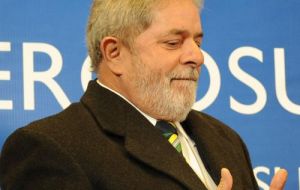MercoPress. South Atlantic News Agency
Lula da Silva’s double challenge as Mercosur chair
 The Brazilian president has also to ensure his party’s victory next October
The Brazilian president has also to ensure his party’s victory next October Consolidating Mercosur as an “undisputed irreversible” integrated block will be Brazilian president Lula da Silva challenge as the pro-tempore chair of the group in the last leg of his eight years in office.
The task must be accomplished in the last five months of his presidency, which ends next January, plus ensuring that his successor as leader of Latinamerica’s largest economy is effectively convinced of Mercosur merits.
“We must keep advancing so that Mercosur is something nobody can have doubts about: that we are convinced-friends in the construction of a political, economic, social and cultural block”, said Lula da Silva on taking the group’s chair from Argentine president Cristina Fernandez de Kirchner this Tuesday.
Following on the San Juan summit success which ended with years of Mercosur frustrations and paralysis anticipating a strong customs union, Lula da Silva and his acknowledged international prestige, can now concentrate on consolidating the integration process.
Argentina’s Cristina Kirchner and Uruguay’s Jose Mujica implicitly supported the role Lula da Silva will be playing in the coming months.
Mrs. Kirchner underlined that Lula da Silva together with her husband and former president Nestor Kirchner were the architects of the re-launching of Mercosur, while Uruguay’s Mujica praised the attitude of the block’s senior members leaders who left behind “chauvinism” and “the idea that each of them was the centre of the world” and opted for a full-hearted integration.
Lula da Silva anticipated that one of his major challenges would be to reach a trade and political association agreement between Mercosur and the European Union, a task which he admitted will force him to overcome the reticence of France that is contrary to any deals regarding the more competitive South American agriculture.
France has the support of at least ten other EU countries, aware of farmers’ volatility in times of squalid political leadership.
However Lula da Silva will also have to watch the domestic front and the electoral campaign (October 3 election) since the opposition’s main candidate, former Sao Paulo governor Jose Serra has been a tenacious critic of Mercosur (sponsored by strong industrial groups in Brazil) and managed to put the issue in the electoral agenda.
Summits have become “a show”, with “little entertainment and less advances”, Serra likes to blast arguing Mercosur has become a “burden” limiting Brazil’s negotiation capacity.
Serra favours more flexible rules inside the block that should help Brazil negotiate agreements with third parties. “Mercosur has become a barrier for Brazil to reach new trade agreements” emphasizes Serra.
He is supported by the influential National Confederation of Brazilian Industry, convinced that without the backpack of Mercosur, Brazil could rapidly achieve a bilateral trade agreement with the European Union.
At the other extreme Lula da Silva’s Workers Party candidate Dilma Rousseff who naturally defends the integration process arguing that it renders Mercosur members as a consolidated block greater negotiation capacity vis-à-vis third parties.
But Brazil also enjoys a bilateral strategic alliance with the EU and now also leads Mercosur negotiations that have been stalled since 2004 and where only resumed last month.
“There’s a strong current in Brazil calling for a bilateral agreement with the EU, and from a Mercosur point of view, this is worrisome”, according to Argentine economist Felix Peña quoted by the Spanish government news agency Efe.
If the idea crystallizes it could trigger a strong division inside Mercosur, because since its creation in 1991 the goal has been a customs union (announced as achieved at the San Juan summit) which among other things means joint trade, investment and cooperation negotiations with other parties.
“What Serra has included in his government program is modifying the original Mercosur charter, back stepping Mercosur to a free trade zone, which Uruguay considers a historic mistake” warned Uruguay’s Deputy Foreign Affairs minister Roberto Conde a few weeks ago.
This in practical terms means that the Brazilian voter will be deciding with his/her ballot the future of Mercosur, even when outgoing President Lula da Silva is working on an exit from stage with an ‘irreversible, undisputed” consolidated integration process.




Top Comments
Disclaimer & comment rules-

Read all commentsSome pearls from this article:
Aug 04th, 2010 - 06:28 am 0Lula said:
“We must keep advancing so that Mercosur is something nobody can have doubts about: that we are convinced-friends in the construction of a political, economic, social and cultural block”,
Pepe said:
”The block’s senior members leaders left behind “chauvinism” and “the idea that each of them was the centre of the world” and opted for a full-hearted integration.”
The goal was:
A customs union (announced as achieved at the San Juan summit) which among other things means joint trade, investment and cooperation negotiations with other parties.
+
An ‘irreversible, undisputed” consolidated integration process.
Commenting for this story is now closed.
If you have a Facebook account, become a fan and comment on our Facebook Page!